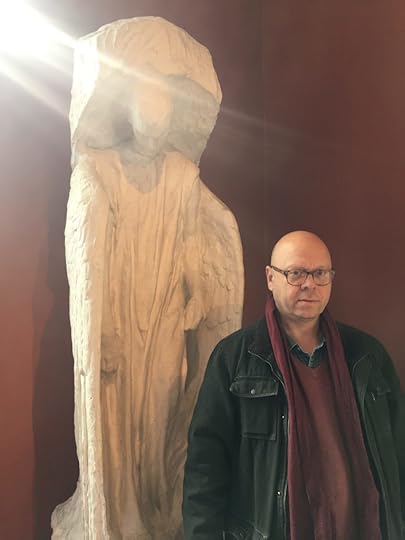Our Life Could Be At Least Doubled

This is a little piece I wrote for the German magazine Wendepunk.t in 2018. I thought it might cheer you up:
Is our existence now actually at a turning point in history? Are we living in the very eye of an apocalyptic storm (or hurricane, even); inside the very core of a critical mass?
It is tempting to believe it, if we judge by the so called media flow – “real” and “fake” alike. Never before has there been such an avalanche of chaotic memes and schemes. However, this is mainly a technological phenomenon; not one of information proper. The messages, reactions, pros, cons, attempts at manipulation and coercion, etc, are basically the same as they were one hundred years ago. But the digital gadgets and gizmos facilitate an unprecedented and amplified onslaught that temporarily shuts down critical thinking and instead opens up the floodgates of clashing emotions, thinly disguised as “debate.” It’s a weight issue considerably more than a “Wait!” issue.
These platforms of encouraged shortsightedness are of course used by all sides, and in all political arenas. Those citizens who are anchored outside this onslaught in terms of time and background have an advantage in realising that what we’re experiencing is something out of the ordinary; they have experienced a time without these gadgets and platforms.
For those immersed in technology since birth or at least youth, it’s considerably more problematic, because what’s inside the technology is inherently regarded as “true.” The technology is both consciously and unconsciously part of a reality in which the truth is somehow embedded. If a critical thinking process or a historical perspective isn’t integrated early on in contemporary schooling, the children will be absolutely helpless in what could definitely be seen as a negative turning point in human culture. Those with an agenda to sell are overjoyed.
But what about the other side then? Critics of technology, myself included, are usually very quick to react emotionally too, and they often loudly remember some distant, golden age in which there was surely some other kind of (criticised) technology too, but not on a level this invasive.
Diametrical dualism pushed to the extreme in simplified messages and a parallel, gradual dismantling of judiciary systems and general ethics. Noise drowns out the signal but instead of fixing it, everyone just raises the volume even more.
“Thus it comes about that all armed prophets have conquered and all unarmed ones failed; for besides what has been already said, the character of peoples varies, and it is easy to persuade them of a thing, but difficult to keep them in that persuasion. And so it is necessary to order things so that when they no longer believe, they can be made to believe by force.” (Macchiavelli, “The Prince”)
Is contemporary reality just a Machiavellian wet dream made manifest by unenlightened cynics? Or are we witnessing, as some claim, a well needed challenge of static political behaviour, primarily contested via amazing new “tech”?
The answer to both questions is a resounding No! What we’re witnessing is merely a “critical mass-flirting” or petting, and an “eye of the storm voyeurism.” None of these phenomena will change anything – unfortunately.
The extremely compensatory behaviour in puerile political pendulums, technological worship, the fetishising of space travel, the immense wealth generated by home-shopping, an uncritical approach to “artificial intelligence,” etc, all leads to the very same conclusion. Which is: In actual fact, nothing is really happening on the overall human level except for a massive denial of guilt. On a higher level though – the bird’s eye view – we are witnessing first-hand how the tangibility of our own wreckage is creeping closer. And creeping closer to home very quickly. That can be quite painful to realise.
The reaction to this is (as we’re experiencing each day in the media flow) supremely compensatory. No really rational agendas beyond existing bureaucracies churning away on detail level. Cherishing artificial intelligence instead of our own, to create an optimally dystopian scenario (Don’t these people read science fiction?). Leaving climate change treatises in defiance while adhering to infantile religionisms and fairytale moralisms. Longing desperately for a safe place in space (where, of course, “no-one will hear you scream!”). Bickering and bitching, and letting lawyers sort out the endless aftermaths.
But still I argue that this is of no real concern to human existence. Our essential needs are profoundly basic, and we are profoundly adaptable when push comes to shove. We have more than enough of everything. It is however of great concern to something that has now taken over large chunks of the (mainly) Western mind frame: the human death wish. It’s a thing. It’s a thing in itself. The unconscious drive to destroy, kill, and most importantly, to be killed, is now so strong that it’s going to be quite hard to stop it. Perhaps even impossible?
And maybe that’s actually a good thing? That it all breaks down before all of the death-wish projections through technology and weaponry destroy too much for sensitive biospheres in general and for other species? A systemic change is obviously needed but I suspect that even such a phenomenon will be sublimated into a kind of “denial of denial.” Not to be escapistically arrogant but rather to inspire by courage in the same arena as the death-mongers. Using the same platforms and media to deny the death drive, deny the moronic media flow, deny unintelligence, deny compensatory simpletons. If enough people stick with their own individual visions, no-one will have a need for an imposed, attempted collective suicide.
The intelligent people will stay safe when the unintelligent crumble in their own rubble and dirt. Then, hopefully, we can get back to being constructive and creative human beings again, smiling and minding our own little businesses. Then the children (of all ages) can finally grow up, individuate, and enjoy life in peace. And create amazing things, as real humans do.
A healthy dose of egotistical survival instinct filtered through poetry and humour could very well be the best way forward. We should allow ourselves to be guided by Salvador Dali rather than by an army of un-individuated engineers and business people who simply wish to die and preferably take the rest of us with them. Let’s deny them that ambivalent pleasure. Let the rest of us get on with life. Amor Fati!
“Proust’s Remembrance of Things Past is not the hyper-individualistic lucubration of a blasé. It is the very healthy basis of a whole Dalinian system by virtue of which the physical span of our life could be at least doubled. For you could then tell yourself that what you are now living you could live again better, at the same time that you were living something different. I especially. Everything which I miss living at every instant, everything that I am wasting at present, all the ineffable, congealed cascades of sensation and emotion which escape me at this moment without my even being aware of it, this whole treasure of life, of time which I am losing, one day I shall find again, with a fresh wonder, in a new and real terrestrial paradise.” (Salvador Dali, “50 Secrets of Magic Craftsmanship”)



